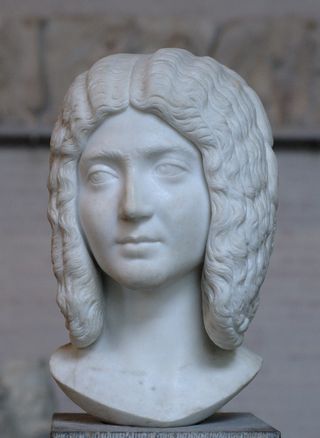Difference between revisions of "Empress Julia Domna"
(→The Roman Empress) |
|||
| Line 12: | Line 12: | ||
<span style="color:#000000;">'''Sobriquet:''' Julia. Empress. Augusta. Mater Castrorum (mother of the camp). | <span style="color:#000000;">'''Sobriquet:''' Julia. Empress. Augusta. Mater Castrorum (mother of the camp). | ||
| − | <span style="color:#000000;">'''Appearance:''' | + | <span style="color:#000000;">'''Appearance:''' Julia Domna is a woman of slight stature, weighing no more than one hundred pounds and five-foot-three inches tall. She has a swarthy complexion that quickly darkens with exposure to the sun. Her hair is long, hanging to the blades of her shoulders and naturally dark, but without dye it is shot with gray streaks; as a general rule, the empress does keep her hair dyed dark which easily takes ten years away from her countenance. Julia's face is one of classical middle-eastern beauty, but she has dark gray eyes, like crystallized iron and an ageless beauty that suggests both severity and suffering. These two traits combined with her slim, some would say waif-like body, causes an almost instantaneous infatuation in both sexes of which Julia seems to be unconscious. At other times, the Augusta obviously and consciously uses her beauty to great and specific effect, though it does not seem to give her any personal pleasure. The mother of the ancient Roman legions, prefers to garb herself the clothing of whatever age she awakens into, but she wears modern clothing with restrained, classical style that always sets her apart from the mortals she associates with. As she has every right to do so, Julia always wears some article of cloth stained with the royal purple and jewelry bearing amethysts. |
<span style="color:#000000;">'''Behavior:''' | <span style="color:#000000;">'''Behavior:''' | ||
Revision as of 00:32, 8 November 2014
- Story 29 - Bellum Horarium -x- Cabiri -x- Beirut
2000 Years Ago
The 21st Century C.E.
The Roman Empress
Epitaph: "Hence no one could, in the light of her career, regard as happy each and all who attain great power, unless some genuine and unalloyed pleasure in life and unmixed and lasting good fortune is theirs. This, then, was the fate of Julia. Her body was brought to Rome and placed in the tomb of Gaius and Lucius. Later, however, both her bones and those of Geta were transferred by her sister Maesa to the precinct of Antoninus."
-- Cassius Dio
Sobriquet: Julia. Empress. Augusta. Mater Castrorum (mother of the camp).
Appearance: Julia Domna is a woman of slight stature, weighing no more than one hundred pounds and five-foot-three inches tall. She has a swarthy complexion that quickly darkens with exposure to the sun. Her hair is long, hanging to the blades of her shoulders and naturally dark, but without dye it is shot with gray streaks; as a general rule, the empress does keep her hair dyed dark which easily takes ten years away from her countenance. Julia's face is one of classical middle-eastern beauty, but she has dark gray eyes, like crystallized iron and an ageless beauty that suggests both severity and suffering. These two traits combined with her slim, some would say waif-like body, causes an almost instantaneous infatuation in both sexes of which Julia seems to be unconscious. At other times, the Augusta obviously and consciously uses her beauty to great and specific effect, though it does not seem to give her any personal pleasure. The mother of the ancient Roman legions, prefers to garb herself the clothing of whatever age she awakens into, but she wears modern clothing with restrained, classical style that always sets her apart from the mortals she associates with. As she has every right to do so, Julia always wears some article of cloth stained with the royal purple and jewelry bearing amethysts.
Behavior:
History:
Recent Events:
http://biography.yourdictionary.com/the-julias-of-rome
http://womenandphilosophyproject.blogspot.com/2013/03/julia-domna-philosopher-julia.html
http://link.springer.com/chapter/10.1007/978-94-009-3497-9_8#page-1

